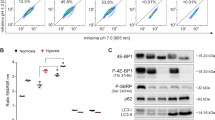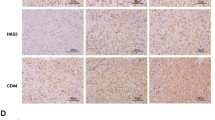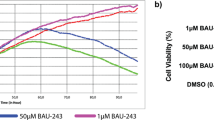Abstract
Aim:
The ubiquitin-proteasome system (UPS) and lysosome-dependent macroautophagy (autophagy) are two major intracellular pathways for protein degradation. Recent studies suggest that proteasome inhibitors may reduce tumor growth and activate autophagy. Due to the dual roles of autophagy in tumor cell survival and death, the effect of autophagy on the destiny of glioma cells remains unclear. In this study, we sought to investigate whether inhibition of the proteasome can induce autophagy and the effects of autophagy on the fate of human SHG-44 glioma cells.
Methods:
The proteasome inhibitor MG-132 was used to induce autophagy in SHG-44 glioma cells, and the effect of autophagy on the survival of SHG-44 glioma cells was investigated using an autophagy inhibitor 3-MA. Cell viability was measured by MTT assay. Apoptosis and cell cycle were detected by flow cytometry. The expression of autophagy related proteins was determined by Western blot.
Results:
MG-132 inhibited cell proliferation, induced cell death and cell cycle arrest at G2/M phase, and activated autophagy in SHG-44 glioma cells. The expression of autophagy-related Beclin-1 and LC3-I was significantly up-regulated and part of LC3-I was converted into LC3-II. However, when SHG-44 glioma cells were co-treated with MG-132 and 3-MA, the cells became less viable, but cell death and cell numbers at G2/M phase increased. Moreover, the accumulation of acidic vesicular organelles was decreased, the expression of Beclin-1 and LC3 was significantly down-regulated and the conversion of LC3-II from LC3-I was also inhibited.
Conclusion:
Inhibition of the proteasome can induce autophagy in human SHG-44 glioma cells, and inhibition of autophagy increases cell death. This discovery may shed new light on the effect of autophagy on modulating the fate of SHG-44 glioma cells.
Similar content being viewed by others
Log in or create a free account to read this content
Gain free access to this article, as well as selected content from this journal and more on nature.com
or
References
Rubinsztein DC . The roles of intracellular protein-degradation pathways in neurodegeneration. Nature 2006; 443: 780–6.
Hershko A . The ubiquitin system for protein degradation and some of its roles in the control of the cell division cycle. Cell Death Differ 2005; 12: 1191–7.
Legnani FG, Pradilla G, Thai QA, Fiorindi A, Recinos PF, Tyler BM, et al. Lactacystin exhibits potent anti-tumor activity in an animal model of malignant glioma when administered via controlled-release polymers. J Neurooncol 2006; 77: 225–32.
Momose I, Iijima M, Kawada M, Ikeda D . A new proteasome inhibitor, TP-110, induces apoptosis in human prostate cancer PC-3 cells. Biosci Biotechnol Biochem 2007; 71: 1036–43.
Yin D, Zhou H, Kumagai T, Liu G, Ong JM, Black KL, et al. Proteasome inhibitor PS-341 causes cell growth arrest and apoptosis in human glioblastoma multiforme (GBM). Oncogene 2005; 24: 344–54.
Yang H, Chen D, Cui QC, Yuan X, Dou QP . Celastrol, a triterpene extracted from the Chinese “Thunder of God Vine,” is a potent proteasome inhibitor and suppresses human prostate cancer growth in nude mice. Cancer Res 2006; 66: 4758–65.
Mathew R, White E . Why sick cells produce tumors: the protective role of autophagy. Autophagy 2007; 3: 502–5.
Kondo Y, Kanzawa T, Sawaya R, Kondo S . The role of autophagy in cancer development and response to therapy. Nat Rev Cancer 2005; 5: 726–34.
Hoyer-Hansen M, Bastholm L, Mathiasen IS, Elling F, Jaattela M . Vitamin D analog EB1089 triggers dramatic lysosomal changes and Beclin 1-mediated autophagic cell death. Cell Death Differ 2005; 12: 1297–309.
Amaravadi RK, Yu D, Lum JJ, Bui T, Christophorou MA, Evan GI, et al. Autophagy inhibition enhances therapy-induced apoptosis in a Myc induced model of lymphoma. J Clin Invest 2007; 117: 326–36.
Shintani T, Klionsky DJ . Autophagy in health and disease: a double-edged sword. Science 2004; 306: 990–5.
Pandey UB, Nie Z, Batlevi Y, McCray BA, Ritson GP, Nedelsky NB, et al. HDAC6 rescues neurodegeneration and provides an essential link between autophagy and the UPS. Nature 2007; 447: 859–63.
Pankiv S, Clausen TH, Lamark T, Brech A, Bruun JA, Outzen H, et al. p62/SQSTM1 binds directly to Atg8/LC3 to facilitate degradation of ubiquitinated protein aggregates by autophagy. J Biol Chem 2007; 282: 24131–45.
Wen PY, Kesari S . Malignant gliomas in adults. N Eng J Med 2008; 359: 492–507.
DeAngelis LM . Brain tumors. N Eng J Med 2001; 344: 114–23.
Milano V, Piao Y, LaFortune T, Groot de J . Dasatinib-induced autophagy is enhanced in combination with temozolomide in glioma. Mol Cancer Ther 2009; 8: 394–406.
Hansen K, Wagner B, Hamel W, Schweizer M, Haag F, Westphal M, et al. Autophagic cell death induced by TrkA receptor activation in human glioblastoma cells. J Neurochem 2007; 103: 259–75.
Ito H, Aoki H, Kühnel F, Kondo Y, Kubicka S, Wirth T, et al. Autophagic cell death of malignant glioma cells induced by a conditionally replicating adenovirus. J Natl Cancer Inst 2006; 98: 625–36.
Ravikumar B, Berger Z, Vacher C, O'Kane CJ, Rubinsztein DC . Rapamycin pre-treatment protects against apoptosis. Hum Mol Genet 2006; 15: 1209–16.
Katayama M, Kawaguchi T, Berger MS, Pieper RO . DNA damaging agent-induced autophagy produces a cytoprotective adenosine triphosphate surge in malignant glioma cells. Cell Death Differ 2007; 14: 548–58.
Watkins SC, Cullen MJ . A qualitative and quantitative study of the ultrastructure of regenerating muscle fibres in Duchenne muscular dystrophy and polymyositis. J Neurol Sci 1987; 82: 181–92.
Paglin S, Hollister T, Delohery T, Hackett N, McMahill M, Sphicas E, et al. A novel response of cancer cells to radiation involves autophagy and formation of acidic vesicles. Cancer Res 2001; 61: 439–44.
Herman-Antosiewicz A, Johanson DE, Singh SV . Sulforaphane causes autophagy to inhibit release of cytochrome c and apoptosis in human prostate cancer cells. Cancer Res 2006; 66: 5828–35.
Erlich S, Shohami E, Pinkas-Kra R . Neurodegeneration induces upregulation of beclin1. Autophagy 2006; 2: 49–51.
Tanida I, Ueno T, Kominami E . LC3 conjugation system in mammalian autophagy. Int J Biochem Cell Biol 2004; 36: 2503–18.
Wang WJ, Li QQ, Xu JD, Cao XX, Li HX, Tang F, et al. Over-expression of ubiquitin carboxy terminal hydrolase-L1 induces apoptosis in breast cancer cells. Int J Oncol 2008; 33: 1037–45.
Jiang PD, Zhao YL, Shi W, Deng XQ, Xie G, Mao YQ, et al. Cell growth inhibition, G2/M cell cycle arrest, and apoptosis induced by chloroquine in human breast cancer cell line Bcap-37. Cell Physiol Biochem 2008; 5–6: 431–40.
Goldberg AL . Protein degradation and protection against misfolded or damaged proteins. Nature 2003; 426: 895–9.
Ding WX, Ni HM, Gao W, Yoshimori T, Stolz DB, Ron D, et al. Linking of autophagy to ubiquitin-proteasome system is important for the regulation of endoplasmic reticulum stress and cell viability. Am J Pathol 2007; 171: 513–24.
Kanzawa T, Germano IM, Komata T, Ito H, Kondo Y, Kondo S . Role of autophagy in temozolomide-induced cytotoxicity for malignant glioma cells. Cell Death Differ 2004; 11: 448–57.
Komata T, Kanzawa T, Nashimoto T, Aoki H, Endo S, Nameta M . Mild heat shock induces autophagic growth arrest, but not apoptosis in U251-MG and U87-MG human malignant glioma cells. J Neurooncol 2004; 68: 101–11.
Hansen K, Wagner B, Hamel W, Schweizer M, Haag F, Westphal M, et al. Autophagic cell death induced by TrkA receptor activation in human glioblastoma cells. J Neurochem 2007; 103: 259–75.
Tafani M, Schito L, Anwar T, Indelicato M, Sale P, Vito MDi, et al. Induction of autophagic cell death by a novel molecule is increased by hypoxia. Autophagy 2008; 4: 1042–53.
Petiot A, Ogier-Denis E, Blommaart EF, Meijer AJ, Codogno P . Distinct classes of phosphatidylinositol 3'-kinases are involved in signaling pathways that control macroautophagy in HT-29 cells. J Biol Chem 2000; 275: 992–8.
Longo L, Platini F, Scardino A, Alabiso O, Vasapollo G, Tessitore L . Autophagy inhibition enhances anthocyanin-induced apoptosis in hepatocellular carcinoma. Mol Cancer Ther 2008; 7: 2476–85.
González-Polo RA, Niso-Santano M, Ortíz-Ortíz MA, Gómez-Martín A, Morán JM, García-Rubio L, et al. Inhibition of paraquat-induced autophagy accelerates the apoptotic cell death in neuroblastoma SH-SY5Y cells. Toxicol Sci 2007; 97: 448–58.
Hou W, Han J, Lu C, Goldstein LA, Rabinowich H . Enhancement of tumor-TRAIL susceptibility by modulation of autophagy. Autophagy 2008; 4: 940–3.
Acknowledgements
This work was supported by the Postdoctoral Science Foundation of China (No 20080440422), International Cooperation Grant (No 20070721, 200705460) and Outstanding Young Scientists Grant (No 20080139) from the Science and Technology Department of Jilin Province.
Author information
Authors and Affiliations
Corresponding authors
Rights and permissions
About this article
Cite this article
Ge, Pf., Zhang, Jz., Wang, Xf. et al. Inhibition of autophagy induced by proteasome inhibition increases cell death in human SHG-44 glioma cells. Acta Pharmacol Sin 30, 1046–1052 (2009). https://doi.org/10.1038/aps.2009.71
Received:
Accepted:
Published:
Issue date:
DOI: https://doi.org/10.1038/aps.2009.71
Keywords
This article is cited by
-
AICAR enhances the cytotoxicity of PFKFB3 inhibitor in an AMPK signaling-independent manner in colorectal cancer cells
Medical Oncology (2022)
-
The Role of the Ubiquitin Proteasome System in Glioma: Analysis Emphasizing the Main Molecular Players and Therapeutic Strategies Identified in Glioblastoma Multiforme
Molecular Neurobiology (2021)
-
Proteasome inhibition boosts autophagic degradation of ubiquitinated-AGR2 and enhances the antitumor efficiency of bevacizumab
Oncogene (2019)
-
Effect of hydrolyzed collagen on thermal, mechanical and biological properties of poly(lactic acid) bionanocomposites
Iranian Polymer Journal (2019)
-
High LC3/Beclin Expression Correlates with Poor Survival in Glioma: a Definitive Role for Autophagy as Evidenced by In Vitro Autophagic Flux
Pathology & Oncology Research (2019)



